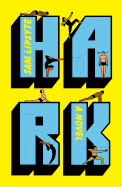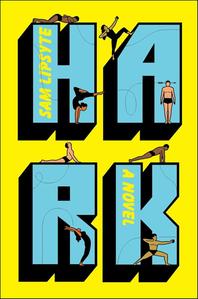
 Teeming with its share of dubious gurus and generating nearly $10 billion in annual revenue in the United States, the self-help industry offers an inviting target for mockery. It seems inevitable, then, that a satirist with the gifts of Sam Lipsyte (The Ask) would take on the challenge. Hark, his fourth novel, is the irreverent story of a reluctant apostle and his motley band of acolytes. They make efforts to spread the gospel of a pseudo-mindfulness technique that's about as substantial as a wisp of wind.
Teeming with its share of dubious gurus and generating nearly $10 billion in annual revenue in the United States, the self-help industry offers an inviting target for mockery. It seems inevitable, then, that a satirist with the gifts of Sam Lipsyte (The Ask) would take on the challenge. Hark, his fourth novel, is the irreverent story of a reluctant apostle and his motley band of acolytes. They make efforts to spread the gospel of a pseudo-mindfulness technique that's about as substantial as a wisp of wind.
Hark Morner is a young comic who's found a profitable gig at corporate team-building events, where he's billed as an "expert in some esoteric practice--knife yoga, reverse hypnosis." He calls his concept "mental archery," inspired by a toy bow he found sticking out of a garbage can. In Hark's mind, the sole purpose of this half-cooked stew of pseudo-psychological teaching is to improve its practitioners' focus. But, in truth, there are "no ideas in mental archery, or no complex ones, just poses, mini-wisdoms, historical nuggets of dubious accuracy. Pearlescent shoals of the stuff."
He's surrounded by a small but loyal brain trust, including Fraz Penzig and his wife, Tovah, general-purpose advisers burdened by their domestic concerns. Kate Rumpler is mental archery's primary funding source, and Teal Baker-Cassini is an ex-convict who's there to provide a semblance of intellectual heft to Hark's hilariously meandering presentations--several of which Lipsyte offers in all their head-scratching inanity. The defining personality trait of all of these characters seems to be free-floating anxiety, as they do their best to promote Hark's program without being entirely sure what it is they are selling.
Hark is relatively light on action, deriving most of its appeal from Lipsyte's darkly comic sensibility, edgy dialogue and the ferocious exaggeration of its premise. But in its final third, the novel takes a decidedly more serious turn, as mental archery migrates from the corporate world to the larger culture and the plot gains some welcome momentum. After a Woodstock-like event featuring Hark turns tragic, moneyed interests focus on commercializing the movement, even as it assumes quasi-religious overtones. Fraz and the others must decide whether they're willing to continue on this bumpy ride.
There's not much that's gentle about Sam Lipsyte's touch, but readers who enjoy fiction that delivers social commentary with a palpable sting will find themselves at home here. --Harvey Freedenberg, freelance reviewer
Shelf Talker: A sendup of the self-help movement for those who take their comedy black.

